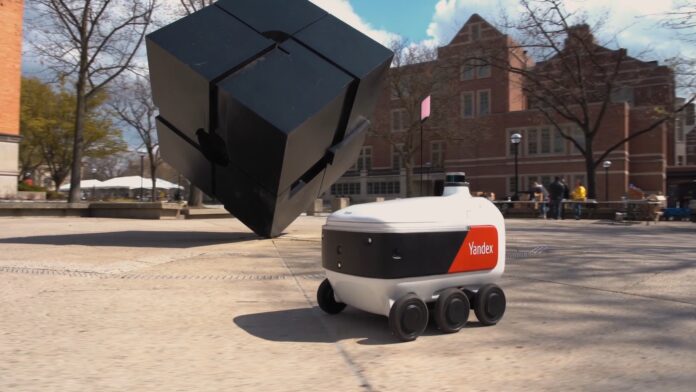BY HARRY WEEKES
It is the beginning of November. I am walking from my hotel to the classroom building where the Society for Human Ecology conference is being held. I am on the University of Arizona campus in Tucson, a place I have never been. Walking down the street is a combination of taking in a new city, navigating through a major university, and working to understand the landscape of an unfamiliar place.
The robots are the most obvious oddity. These are effectively coolers on wheels, each with a small pole sticking out the top adorned with a flashing light. These coolers chug down the sidewalk, light blinking. When they get to an intersection, they pause. The light starts to blink rapidly. Cars stop. People sidestep them. And they proceed. I later found out these were automated delivery vehicles, carrying different kinds of snacks to different locations on campus. I can only imagine how many of these have been hijacked and pried open for what they are carrying, like a kind of robotic pomegranate.
It is not until I am on the street outside of the conference center that one sound immediately perks my ears. It is high pitched and comes in a series of bursts. I don’t know that it was the loudest sound, just the most piercing. It is disorientingly familiar. I know the sound, but I am struggling to recognize it. It is kind of like seeing someone from your hometown in a different city, or when you run into someone in the supermarket who you only know in a completely different context.
But this sound is one that is more than just an acquaintance. It is a kestrel. An American kestrel. It is its alarm call. Or maybe its irritation call. It is the one the birds give when they are unhappy. The bursts are undulating. The bird is in flight and it is disgruntled. I do not know this bird, but I know this call. I look into the blue sky and, sure enough, my pointy-winged friend is moving like a feathered sine wave in the sky.
This past fall, my students and I learned about “the extended mind”—a term psychologists and sociologists use to refer to our ability to have elements of our surroundings become an extension of our mind. The obvious example they use is a smart phone, that repository for calendars, photos, contacts, and increasingly the place where everything is stored. We spend so much time on and with our phones that now people are having tactile hallucinations that their phone is vibrating when it’s not even on them. The phone, in this case, has become assimilated into our nervous systems.
I think the human mind was born extended, with one of the most tragic elements of our march toward civilization being a gradual trimming of so many of the extensions that connected us to the natural world. Our almost obsessive desire to be apart from our environment has turned the great and labyrinthine forest of our mind into a kind of mental bonsai.
Hearing this bird not only expanded my awareness, it connected me instantaneously to a broader world. Yes, it connected me to this bird. It also connected me to another one. You see, a kestrel makes this noise in response to something. And that something is not a cactus. I stood there and scanned as much of the skyline as I could see—the geometric lines of buildings, vents, and antennae, and… there. Sitting on the edge of the building. A raptor in its quintessential raptor hunch.
“Ahhh, yes… there you are.”
I had no idea who the raptor was, so I just stood there for a while, watching and listening. And gently feeding and coaxing that little unruly branch poking out of the topiary.
“Grow. Grow.”
Harry Weekes is the founder and head of school at The Sage School in Hailey. This is his 52nd year in the Wood River Valley, where he lives with Hilary and one of their three baby adults—Simon. The other members of the flock are Georgia and Penelope (Georgia recently fledged from Davidson College in North Carolina and Penelope is at Middlebury College in Vermont).



